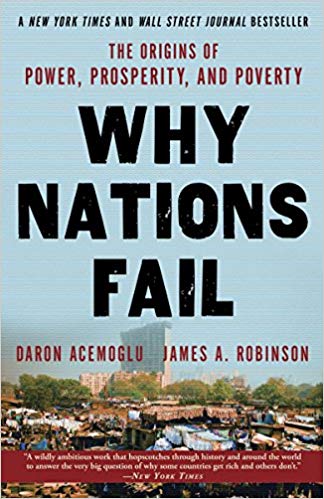Why Nations Fail Summary
10 min read ⌚
 The Origins of Power, Prosperity and Poverty
The Origins of Power, Prosperity and Poverty
Some countries are rich, and others are poor.
Why?
Daron Acemoglu and James A. Robinson try to give a definite answer to these questions in their ultra-popular and heavily discussed book:
Who Should Read “Why Nations Fail”? And Why?
Why Nations Fail, writes Jared Diamond, “should be required reading for politicians and anyone concerned with economic development.”
It should also be required reading for those who want to understand why some nations are rich and others poor, as well as those who want to put an end to inequality and corruption.
About Daron Acemoglu and James A. Robinson
 Daron Acemoglu is a Turkish-born American economist and professor of economics at the Massachusetts Institute of Technology for the past two and a half decades.
Daron Acemoglu is a Turkish-born American economist and professor of economics at the Massachusetts Institute of Technology for the past two and a half decades.
After completing his Ph.D. at the London School of Economics in 1992, Acemoglu embarked on a very successful career which made him one of the most recognizable economists of the 21st century.
In fact, a 2011 survey of American economists ranked him the third most favorite living economist under the age of 60 (just behind Paul Krugman and Greg Mankiw), and a 2015 study named him the most cited economist of the past decade.
 James A. Robinson is a British economist and political scientist with a Ph.D. from Yale University; he has worked as a professor of economics at numerous prestigious institutions, currently at the Harris School of Public Policy, University of Chicago.
James A. Robinson is a British economist and political scientist with a Ph.D. from Yale University; he has worked as a professor of economics at numerous prestigious institutions, currently at the Harris School of Public Policy, University of Chicago.
A close collaborator of Acemoglu, Robinson is mostly interested in the comparative political and economic development of countries in Sub-Saharan Africa and Latin America.
He has written quite a few books and studies, many of them collaborations.
Acemoglu and Robinson have written two books together: Economic Origins of Dictatorship and Democracy and Why Nations Fail.
“Why Nations Fail Summary”
In Why Nations Fail, Daron Acemoglu and James A. Robinson set before themselves a very ambitious task: to pinpoint, once and for all, the real reasons why some countries are rich and prosperous, and why others are poor and doomed to fail all over again.
In fifteen chapters, they lay out a thought-provoking theory which, if not something more, has incited a lively discussion among the most famous economists, intellectuals, and political thinkers of the XXI century.
Let’s see what all the fuss is about.
The Existing Explanations
It isn’t difficult to guess that Why Nations Fail isn’t the first book to try to get to the bottom of the “rich vs. poor countries” quandary.
And it is even easier to suppose that before presenting their theory, Acemoglu and Robinson try to point to the faults of other people’s explanations of the problem.
They group them into several categories, which we’ll further group into three.
Geography and Climate
According to the geography hypothesis most eloquently demonstrated by Jared Diamond in Guns, Germs, and Steel, some nations were merely lucky enough to form countries in locations blessed with pleasant climates.
There’s a reason why the poorest countries in the world are located in tropical regions, and why the wealthiest can be found in cooler climatic zones.
Simply put, diseases are more likely to develop in the tropical zones of central Africa and America, and, thus, it is only natural to expect a Zambian to be far less productive than a Norwegian.
However, ask Acemoglu and Robinson, then why are neighboring countries such as North Korea and South Korea so different?
Moreover, why is Singapore so prosperous, even though it is located in the tropical climate zone.
Culture and Religion
According to the culture hypothesis, some people are simply more inclined to work than others, because of their cultural and religious heritage.
Most of the developed countries, for example, went through the Protestant Reformation.
And, as any Protestant knows, work is a religious duty, and everyone should embrace it; so, it’s only natural to expect that a country with a Protestant past should be far more prosperous than one with, say Confucian values.
Because the latter thinks that humanity, loyalty, and honesty is much more important than work and success; and, because economics is, well, to quote Thomas Carlyle once again, a dismal science.
However, this once again fails to explain why North Korea is one of the poorest countries in the world, and South Korea one of the most developed ones.
Ignorance
According to the final group of explanations, the ignorance hypothesis, North Korea is less developed than South Korea because of the ignorance of the ruling elites.
In other words, the people who ruled North Korea were incompetent, and instead of solving problems, they merely created more; on the contrary, those who ruled South Korea understood the root of the problems and tried to solve them.
This does explain some things, but it doesn’t do well in the case of others.
A few case studies provided by Acemoglu and Robinson – such as, for example, Ghana – show that it is not the ignorance of political leaders that causes the economic decline of countries, but it is, on the contrary, their very shrewd understanding that this decline also leads to their personal economic evolution.
And that’s basically the main point of Acemoglu and Robinson’s study.
Rich countries are founded around inclusive and uncorrupted economic and political institutions; poor countries, on the other hand, suffer because of extractive institutions.
Let’s analyze both of them in detail.
Inclusive Institutions
In essence, inclusive – or integrative – institutions are those which allow large groups of people to have a say in political and economic decision-making.
Inclusive institutions give individual members of a society access to high-quality education and allow them to freely choose the profession they like.
They also incentivize them to be creative and challenge the status quo.
And this is especially important because it provides a relatively fair and level playing ground in which the talented know that they can benefit by providing benefits to other people.
Bill Gates and Jeff Bezos became the wealthiest people in the world because their products made the lives of many people easier; however, Carlos Jesus Slim in Mexico earned his money by exploiting the monopoly in landline telephony.
The extractive institutions in Mexico allowed him to prosper and become rich without providing his countrymen additional value; integrative institutions would almost never allow this.
And how do inclusive institutions come about?
Well, interestingly enough, in many cases, merely by accident.
Consider the example of the Glorious Revolution of 1688 in England; in less than a century, this revolution would lead to the Industrial Revolution which would eventually change the world in ways nothing before ever did, practically marking the beginning of the “rich vs. poor” debate, as argued in A Farewell to Alms.
And it all started because of the plague.
The plague, you see, had led to the deaths of so many people, that, the ones who survived had to work the jobs of five and still received the paycheck for one.
So, they rebelled, and the attempt to meet their demands eventually led to the establishment of economic institutions that guaranteed the protection of private property and, with it, introduced actual free market policies.
The rest is history.
Extractive Institutions
Extractive institutions are – you’ve guessed it – the very opposite of inclusive institutions.
Acemoglu and Robinson call them extractive because they believe that the thing which defines these institutions is their inclination to extract wealth from those who are not part of them.
So, in countries ruled by extractive institutions, there are always two classes, with the first one (the elite) always in a position to repress the latter one.
The only way for those who are not in power to prosper in a country governed by extractive institutions is to join the vicious circle, i.e., to become part of the elite and prevent others from doing it.
Extractive institutions disincentivize people from taking part in the political and economic processes of a country; the reason for this is simple: they want to keep the status quo.
Now, don’t get Acemoglu and Robinson wrong: they firmly believe that in addition to inclusive institutions, centralized political power is a must if you want to create a wealthy and prosperous country.
However, there’s a limit to how centralized it should be since the economic processes are too complicated for one to be able to predict the results.
For example, in the time of Stalin, the centrally planned economy of the USSR decided to reward workers with bonuses as high as a third of their paycheck for exceeding the assigned quotas.
This did the trick for a while, and the USSR became the second-largest economy in the world; however, in retrospect, it also disincentivized these workers to think outside the box, which prevented the process of creative destruction (Schumpeter).
But, then again, extractive institutions fear innovation and creative destruction, since these forces usually lead to them losing their power.
So, they stifle them, and thus, cause the failure of their countries.
The Curious Case of China
Now, Acemoglu and Robinson are capable of explaining many things through their framework, but, even at first glance, China is a curious case.
Even though it is still an authoritarian country, China’s economy is growing at such a rapid pace that many have started wondering if we’re living the last years of American dominance.
So how did China succeed in becoming the second-largest economy in the world even though still a communist country ruled by extractive institutions?
Well, according to Acemoglu and Robinson, the main reasons for this are the inclusive policies advocated by Deng Xiaoping, whose economic reforms opened China’s economy to the world and, in addition, they reoriented it internally towards market-based economic programs.
However – and this is the more exciting part of Acemoglu and Robinson’s analysis – their model predicts that, unless China furthers the inclusiveness of its institutions, its growth will steeply drop over the next decade.
What we may be seeing is just another case of the 1970s Soviet Union.
Back then, the relocation of labor from the agricultural sector to the manufacturing industry worked wonders, but twenty years later, the USSR collapsed.
Something similar may happen to China as well unless the country improves its political and economic inclusiveness.
Now, that’s a bold prediction.
Key Lessons from “Why Nations Fail”
1. The More Inclusive the Institutions, the Richer the Country
2. Democracy Evolves Because of the Threat of Revolutions
3. Foreign Aid Is Sometimes the Opposite
The More Inclusive the Institutions, the Richer the Country
The central thesis of Acemoglu and Robinson’s Why Nations Fail is that economic prosperity depends on the inclusiveness of the political and economic institutions of a country.
In other words, the more people make political and economic decisions, the better off a country is supposed to be.
Inclusive institutions flourish because they change. And they change because they allow people to freely choose their professions and the market to guide the country on a prosperous path through its invisible hand.
Extractive regimes, in contrast, are more interested in keeping the status quo, since it is the status quo that allows them to remain in power.
However, the status quo means no innovation or creative destruction, and this is the main reason why some nations have never – and may never – attain wealth.
One more thing, though: a powerful, centralized government is always essential, because, as the case of Somalia shows, without it, neither the free market nor anything else really works.
Libertarians would, of course, beg to differ.
Democracy Evolves Because of the Threat of Revolutions
According to Acemoglu and Robinson, the history of democracy is the history of revolutions prevented.
They think that all societies must begin as non-democratic regimes in which elites rule through extractive governments.
However, at some point, the ruled realize, to quote Marx, that they have nothing to lose but their chains, and this is when they start pondering whether revolution is the optimal escape from their doom.
Since a revolution would cost them all of their benefits, the rich act so that they lose only some of them. Namely, they propose smaller taxation rates and appropriate measures that don’t necessarily lead to revolution; in turn, this causes redistribution which helps some of the ruled ones move vertically upward.
And this works until it doesn’t anymore – when the process restarts.
Thus, democratization happens when the rich try to avoid revolution by willingly increasing monetary redistribution and making some of the poor richer.
In time, this leads to the inclusion of many, and to the transformation of extractive institutions to inclusive ones:
Inclusive economic and political institutions do not emerge by themselves. They are often the outcome of significant conflict between elites resisting economic growth and political change and those wishing to limit the economic and political power of existing elites.
Foreign Aid Is Sometimes the Opposite
Interestingly enough, the analysis above implicitly suggests that foreign aid will more often do a disservice to a country rather than help it.
In simpler terms, if a country is ruled by extractive institutions, foreign aid will rarely reach the intended addressees and will be, in fact, used by the elites to corrupt even more people interested in defending the status quo.
An excellent example of this process is Afghanistan, a country which, despite billions of dollars in foreign aid, hasn’t prospered almost two decades after the fall of the Taliban!
Final Notes
In conclusion, “Why Nations Fail” serves as a compelling elucidation on the underlying factors determining the prosperity or impoverishment of nations.
Acemoglu and Robinson’s comprehensive analysis underscores the pivotal role of inclusive institutions in fostering economic growth and societal advancement.
Their scrutiny of historical precedents and contemporary case studies yields invaluable insights into the intricate dynamics of political and economic systems.
As we navigate the complexities of global development, this seminal work reminds us of the imperative to prioritize inclusive governance and dismantle extractive structures.
Ultimately, the enduring relevance of “Why Nations Fail” lies in its capacity to inspire informed discourse and catalyze meaningful reforms aimed at fostering equitable progress on a global scale.
Like this summary? We’d like to invite you to download our free 12 min app for more amazing summaries and audiobooks.
“Why Nations Fail Quotes”
Poor countries are poor because those who have power make choices that create poverty. Share on X Politics is the process by which a society chooses the rules that will govern it. Share on X The most common reason why nations fail today is because they have extractive institutions. Share on X Traditionally economics has ignored politics, but understanding politics is crucial for explaining world inequality. Share on X Economics has gained the title Queen of the Social Sciences by choosing solved political problems as its domain. Share on XOur Critical Review
Why Nations Fail is both an engaging and thought-provoking read.
As we pointed out in the “Who Should Read This Book” section, even Jared Diamond, who has found many faults with its central thesis, endorses it full heartedly.
And we share his enthusiasm!
The central thesis of the book may be a bit reductive and constraining, but it is nevertheless one which will be debated for many decades.
And what more can you ask from a book?
Emir is the Head of Marketing at 12min. In his spare time, he loves to meditate and play soccer.


 The Origins of Power, Prosperity and Poverty
The Origins of Power, Prosperity and Poverty




